Hatten-Macik take Redfish Series Championship title
Protected pond produces $100,000 win for Texas team
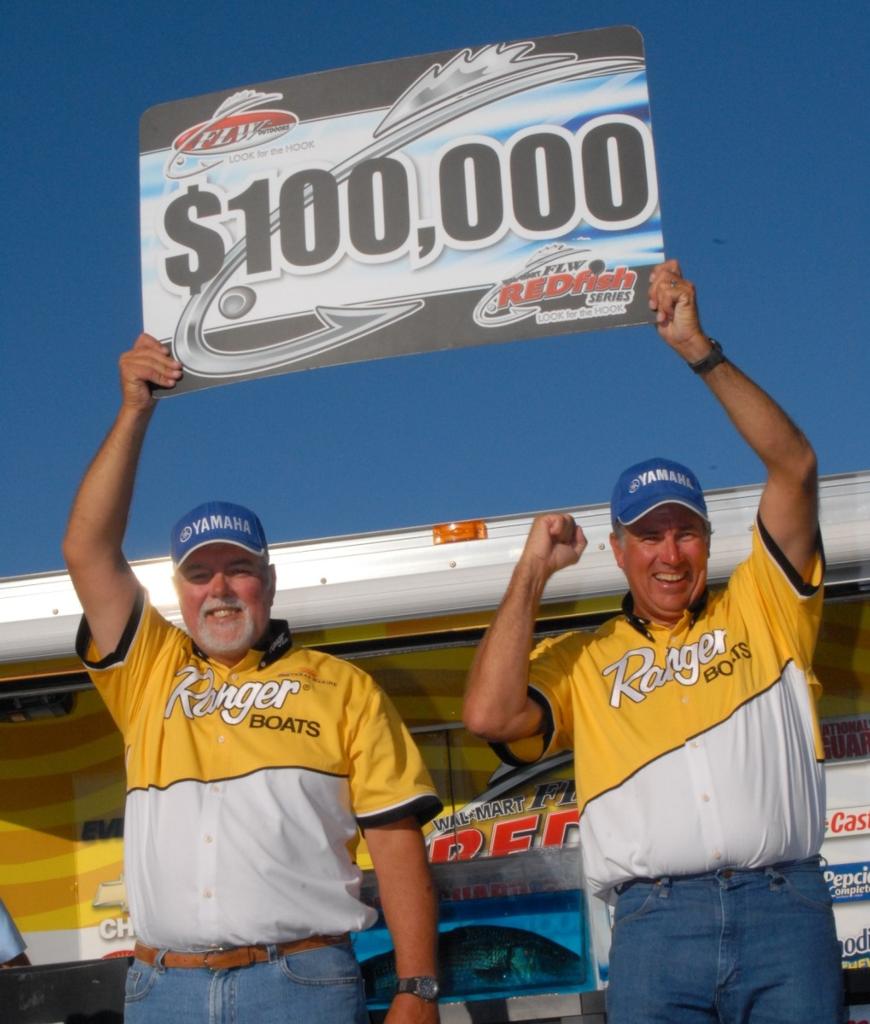
ORANGE BEACH, Ala. – Location, location, location: it’s a fundamental axiom for those who are successful in the real estate business. And the same could be said for those who are successful in professional redfish tournaments.
Each time the Wal-Mart FLW Redfish Series has come to the east-central Gulf Coast for the year-end championship, the key for the eventual winners has been location – finding a single spot that will produce redfish for three days in a row despite a myriad of changing conditions.
And that’s exactly what Bennie Hatten of Deer Park, Texas, and Randy Macik of Bay City, Texas, did this week to win the 2007 FLW Redfish Series Championship in Orange Beach, Ala.
Today the team defended their lead with two redfish weighing 10 pounds, 4 ounces to claim the $100,000 top prize (including contingencies) with a three-day total of 35 pounds, 1 ounce.
“When Dan (Grimes) called out our weight, it was unbelievable,” Hatten said. “I knew this 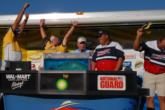 tournament was finally over, and Randy and I were left on top.”
tournament was finally over, and Randy and I were left on top.”
The team found their perfect winning location two weeks ago when they were scouting the Mississippi marsh near Pascagoula. They discovered a 20-acre pond that was brimming with transparent tea-colored water, bait and, of course, redfish.
When we first found the fish, we couldn’t get them to bite anything,” Hatten said. “We could see them, but they just were not interested in anything we had.
“Finally, we got a few rises on topwaters, but they still wouldn’t take it. Then we started changing colors, and I put on an all-white Rapala Skitterwalk and, bingo, it was like we hit the switch – they would just devour that topwater. I have never seen redfish tune into just one bait and one color like that. It was like magic.”
When the team returned for practice early this week, they checked their pond and were amazed to find that the fish were still there, and they were still smashing the white Rapala Skitterwalk with reckless abandon.
The team spent the entire tournament in the precious pond, located about an hour and 45 minutes west of Orange Beach. But each day they had to adjust with the wind.
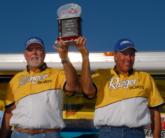 “There was a lot of marsh around us, but this one pond was just a little deeper – about 3 feet in the middle – and the fish seemed to be funneling into it from the shallower marshy areas and relating to the points,” Hatten said. “Each day the fish moved according to the wind direction, and we had to reposition to catch them.
“There was a lot of marsh around us, but this one pond was just a little deeper – about 3 feet in the middle – and the fish seemed to be funneling into it from the shallower marshy areas and relating to the points,” Hatten said. “Each day the fish moved according to the wind direction, and we had to reposition to catch them.
“No matter which way the wind blew, they always preferred the calm banks rather than the side with the wind blowing in on it. And with the wind switching directions all week, we had to adjust every day and catch them on whatever was the calm bank for that day.”
While wind hampered some anglers and the massive amounts of rain over the first two days flushed out other competitors’ water, the Texas team’s perfect pond held up under all conditions.
“That was really the key,” Hatten added, “the fact that the pond was so protected from all the conditions and also that no one else found it – a perfect scenario for winning a redfish tournament.”
Patterson-Phillips runners-up
Mike Patterson and Brett Phillips, both of Rockport, Texas, almost made a monster run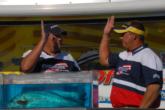 to Louisiana pay off in a big way today.
to Louisiana pay off in a big way today.
The team spent seven hours riding in a boat and just one hour and five minutes actually fishing. In that scant hour’s time, they boated two redfish for 11 pounds, 6 ounces to make a major jump in the standings.
But in the end, it just was not enough, and the team finished second with a three-day total of 33 pounds, 13 ounces, worth $15,120.
“We did what we had to do,” Phillips said. “We ran over there, caught our fish and made it back – it just wasn’t quite enough.”
During their small window of fishing time, the team threw spinnerbaits teamed with Bass Assassin Slurp Sea Shads in a red shad color for their keepers.
Walter-Winters take third
 Kris Walter of Hudson, Fla., and Danny Winters of Tampa, Fla., finished third with a three-day total of 33 pounds, 1 ounce for $5,760.
Kris Walter of Hudson, Fla., and Danny Winters of Tampa, Fla., finished third with a three-day total of 33 pounds, 1 ounce for $5,760.
Even though they finished third, the team won the unofficial award of being the highest finisher for the least number of miles traveled.
Each day the team headed west for just 20 minutes before settling into its primary spot – merely a hop, skip and a jump compared to the distances others were traveling.
“That was our plan from the beginning,” Winters said. “We finished second in last year’s championship by fishing close, and we chose that strategy again, hoping bad weather would keep guys from making those long runs.”
The team fished a tidal creek running though a nearby marsh.
“We were throwing a 3/8-ounce spinnerbait with a shad tail trailer to the shallower points and casting a ¼-ounce Berkley Gulp jerk shad to the deeper curves and bends in the creek,” Walter noted. “Sometimes when a fish would wake up behind Danny’s spinnerbait and not get it, I’d pitch that jerk shad right back in there and catch it.”
Whites fourth
The father-son duo of Steve White of Petal, Miss., and Barnie White of Brewton, Ala., 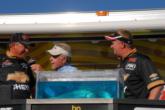 finished fourth with a three-day total of 30 pounds, 8 ounces for $9,390.
finished fourth with a three-day total of 30 pounds, 8 ounces for $9,390.
“We went straight to my big-fish spot up near the I-10 causeway in Mobile this morning, and it looked like a parking lot,” Barnie White said. “It’s a popular redfish hole up there, and with the weather so nice today, there were a bunch of people already fishing it when we got there.”
The team eventually made their way back down to Heron Bayou near the Alabama-Mississippi state line and cast spinnerbaits and Mann’s tidewater spoons to catch their fish.
Bertha-McKenzie run out of time for fifth
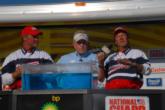 When Gary McKenzie of Bartow, Fla., and Sam Bertha of Bunnell, Fla., left the dock this morning, they had a 160-mile journey to Louisiana plotted out on their GPS.
When Gary McKenzie of Bartow, Fla., and Sam Bertha of Bunnell, Fla., left the dock this morning, they had a 160-mile journey to Louisiana plotted out on their GPS.
But a series of complications, including an 80-foot barge getting 8,000 gallons of diesel at the marina where they had planned to refuel, cut into their fishing time. In all the Florida team got to fish a grand total of 20 minutes – not quite enough to catch any fish.
The “hero or zero” plan landed on the zero side of the coin, and Bertha and McKenzie had to settle for fifth, worth $7,200.